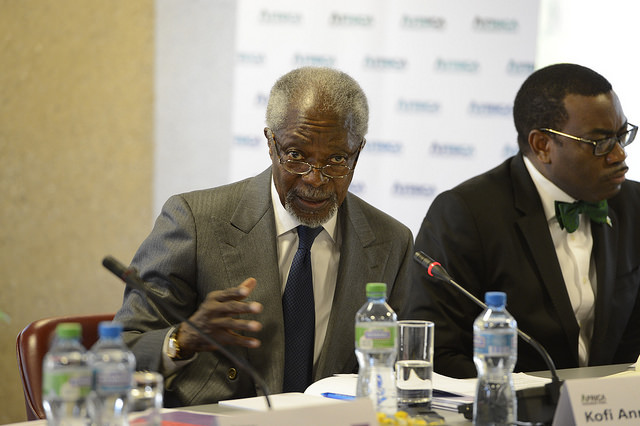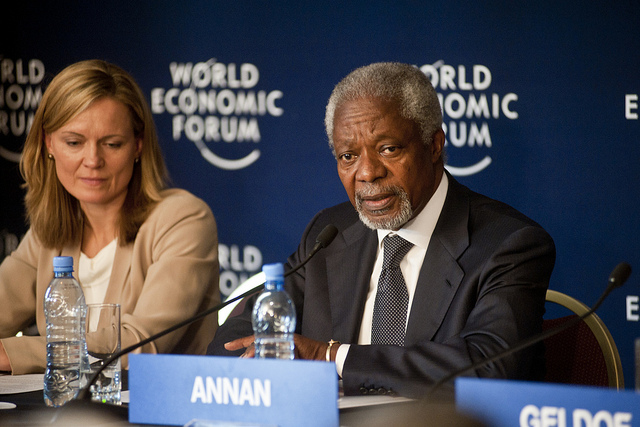
By Alex Kirby
Developed countries should rapidly end subsidies for fossil fuels, says a group established to argue for equitable and sustainable development for Africa.
The Africa Progress Panel (APP), chaired by the Nobel laureate and former UN secretary-general Kofi Annan, says the G20 countries should set a timetable for phasing out the payments, with a ban on exploration and production subsidies as soon as 2018.
“Many rich country governments tell us they want a climate deal, but at the same time billions of dollars of taxpayers’ money are subsidising the discovery of new coal, oil and gas reserves,” Mr Annan said. “They should be pricing carbon out of the market through taxation, not subsidising a climate catastrophe.”
The APP also urges African governments, investors, and international financial institutions to increase investment in energy significantly in order to unlock Africa’s potential as a global low-carbon superpower.
Poverty and inequality
The report, “Power, People, Planet: Seizing Africa’s Energy and Climate Opportunities”, calls for a tenfold increase in power generation to provide all Africans with access to electricity by 2030. This, it says, “would reduce poverty and inequality, boost growth, and provide the climate leadership that is sorely missing at the international level”
The panel recognises recent improvements in the negotiating positions of the European Union, the US and China. But it says that current proposals still fall far short of a credible deal for limiting global warming to the internationally-agreed threshold of no more than 2˚C above pre-industrial levels.
It also condemns Australia, Canada, Japan and Russia for, as it puts it, effectively withdrawing from constructive engagement on climate.
“By hedging their bets and waiting for others to move first, some governments are playing poker with the planet and future generations’ lives,” Mr Annan said. “This is not a moment for prevarication, short-term self-interest, and constrained ambition, but for bold global leadership and decisive action.
“Countries like Ethiopia, Kenya, Rwanda and South Africa are emerging as front-runners in the global transition to low carbon energy. Africa is well positioned to expand the power generation needed to drive growth, deliver energy for all, and play a leadership role in the crucial climate change negotiations.”
Mr Annan said the panel categorically rejected the idea that Africa had to choose between growth and low-carbon development.
The report tells a stark story of what the continent’s energy poverty means. In sub-Saharan Africa, it says, 621 million people – more than half of Africa’s population – lack access to electricity, and the number is rising. Excluding South Africa, which generates half the region’s electricity, the whole of sub-Saharan Africa uses less electricity than Spain.
It would take the average Tanzanian eight years to use as much electricity as an average American consumes in a single month. And, over the course of one year, someone boiling a kettle twice a day in the UK uses five times more electricity than an Ethiopian consumes in a year.
The report urges African governments to use the region’s natural gas to provide domestic energy as well as exports, and to harness Africa’s vast, untapped renewable energy potential.
Energy infrastructure
It says corruption must be cut, utility governance made more transparent, regulations strengthened, and public spending on energy infrastructure increased.
It calls as well for strengthened international co-operation to close Africa’s energy sector financing gap, estimated to be US$55 billion annually to 2030. This includes US$35 billion for investments in plant, transmission and distribution, and US$20 billion for the costs of universal access.
A global connectivity fund, with a target of reaching an additional 600 million Africans by 2030, is needed to drive investment in on-grid and off-grid energy provision.
The report challenges African governments and their international partners to raise their ambitions for the United Nations climate summit in Paris in December.
It says 2015 is the year not only for a climate agreement, but for agreeing the Sustainable Development Goals and how to finance them. And it recalls Nelson Mandela’s words on the ending of apartheid: “It always seems impossible until it’s done.”









